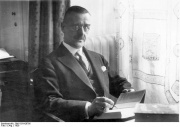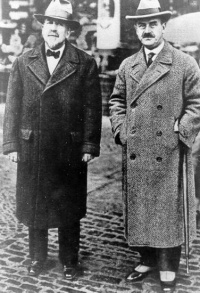Position on the First World War↑
During the war years, Thomas Mann (1875-1955) took political and aesthetic positions that were diametrically opposed to those of his brother, Heinrich Mann (1871-1950). From the beginning, Thomas Mann justified, praised and celebrated the war, and repeatedly focused on the special condition of the German psyche which, in his view, explained the German readiness for war as well as his own intellectual background. In November 1914, he published his Gedanken im Kriege ("Thoughts in War"), followed in 1915 by Frederick the Great and the Coalition, and shortly thereafter by Gedanken zum Kriege ("Thoughts about War").
Publications↑
The basic concepts of these early texts (which led to a long and lasting period of estrangement between the brothers, who had until then entertained a close artistic relationship) are summed up in a very lengthy, and almost obsessively defensive essay titled Betrachtungen eines Unpolitischen (“Reflections of an Nonpolitical Man”), published in October 1918. "Thoughts in War" appeared only a few weeks after the “Manifest of the Ninety-Three”, in which leading German literary and academic representatives addressed the international “world of culture” (“Kulturwelt”) and tried to justify the violation of Belgian sovereignty by advancing German troops, as well as the brutal massacre and retaliation against alleged partisans, and the burning of the famous university library of Leuwen. Explicitly, they defended German militarism as an indispensable guarantor of culture.
In his own text, Thomas Mann, who had not signed this manifest, went even further by 1) praising the war as a purifying and necessary experience, and 2) by claiming that the German position was the reflection and defense of a higher culture. According to Mann, Germans had to defend themselves against a shallow Western civilization, which stood for “reason, enlightenment, moderation, moralization, skepticism, dissolution – and mind” as well as affluence and acquiescence, while German cultural values were concerned with “a certain organization of the world.” War is thus celebrated by Mann as a highly welcome departure from the lures of civilizational affluence, a return to mystical life values, and a preservation of national characteristics.[1]
The scope of the “Reflections” is even broader, while continuing to follow the same ideological goals. Thomas Mann emphasizes the special geographical situation held by Germany, which did not share “Western” values, the tradition of Protestantism (with its religious and political connotations) and, finally, German cultural traditions, especially in music and philosophy, for example Arthur Schopenhauer (1788-1860), Friedrich Nietzsche (1844-1900) and Richard Wagner (1813-1883). As a “spiritual people”, Mann considered Germans to be apolitical or even anti-political, which is also how he self-identified. According to Mann, this made Germans conservative proponents of monarchy, which Mann argued, included many freedoms in its modern form.
Mann vehemently attacked the concept of the so-called “Zivilisationsliterat”, namely, a proponent of literature advocating progressive or democratic values, as an unpatriotic or anti-German concept. This was because it betrayed the very foundations of truly German art. Thomas Mann referred to Heinrich Mann’s essay entitled Zola throughout, quoting his brother consistently without explicitly mentioning his name. Thomas Mann also critiqued his brother’s novel Der Untertan and calls it a “distorted portrayal without a realistic base” (“ein Zerrbild ohne Wirklichkeitsgrund”).[2]
Conclusion↑
Thomas Mann’s essay Betrachtungen was published in October 1918, and influenced the positions of the so-called “conservative revolution” during the early years of the Weimar Republic. While the author ultimately changed some of his views, including those on war and monarchy, most of his philosophical and aesthetic concepts had an impact that carried far beyond the war years.
Jürgen Pelzer, Occidental College
Section Editor: Frederik Schulze
Notes
Selected Bibliography
- Assheuer, Thomas: Krieg veredelt den Menschen. Alles nur ein Spiel mit Worten? Thomas Manns berüchtigte 'Betrachtungen eines Unpolitischen' in einer Neuausgabe, in: Die Zeit 10, 4 March 2010, pp. 44.
- Mann, Thomas: Betrachtungen eines Unpolitischen, Frankfurt a. M. 2009: Fischer.
- Mann, Thomas: Reflections of a nonpolitical man, New York 1983: F. Ungar.
- Vollmer, Michael: Die Macht der Bilder. Thomas Mann und der Erste Weltkrieg, Berlin 2014: be.bra verlag.









